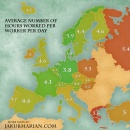 |
The Raven – Stanza XIV explained
Stanza XIV of Edgar Allan Poe’s poem The Raven is one of the hardest pieces of English literature to understand for a non-native speaker. (...)
May 13, 2015 – Jakub Marian – English
|
 |
‘Graphics is’ vs. ‘graphics are’ – singular or plural?
There are many singular English nouns that end with an “s”, such as mathematics, physics, or politics. Those are typically names of (...)
May 11, 2015 – Jakub Marian – English
|
 |
‘Dwarves’ or ‘dwarfs’ – which spelling is correct?
It may come as a great surprise to the fans of The Lord of the Rings, but the correct traditional spelling of the plural of “dwarf” is (...)
May 6, 2015 – Jakub Marian – English
|
 |
‘More better’ is not always wrong (but usually it is)
The comparative degree (“more of something”) of monosyllabic adjectives is usually formed by adding -er at the end of the adjective, (...)
May 3, 2015 – Jakub Marian – English
|
 |
Words ending with -ung are feminine in German
There are over 20,000 nouns in German that end with -ung, so if there is a rule that applies to them all, it is definitely worth learning. (...)
May 3, 2015 – Jakub Marian – German
|
By the way, have you already seen my brand new web app for non-native speakers of English? It's based on reading texts and learning by having all meanings, pronunciations, grammar forms etc. easily accessible. It looks like this:
 |
German suffix -ant: masculine nouns
There are over 300 nouns in German that end with “ant”, and almost all of them are masculine (i.e. they have the article “der”), such (...)
May 1, 2015 – Jakub Marian – German
|
 |
‘I am agree’ vs. ‘I am of agreement’ vs. ‘I agree’ in English
Saying “I am agree with you” is a common error among native speakers of Romance languages. For example, when you want to say that you (...)
April 30, 2015 – Jakub Marian – English
|
 |
Average hours worked per day by country in Europe (map)
The following map shows the number of hours an average worker in the given country works each day (not just on working days), on average. (...)
April 28, 2015 – Jakub Marian – Maps
|
 |
‘I just did it’ vs. ‘I have just done it’ – present perfect or past simple?
The traditional (but now somewhat outdated) rule dictates that “just” is to be used with the present perfect, not the past simple, as (...)
April 26, 2015 – Jakub Marian – English
|
 |
Nouns ending with -heit and -keit in German
All German nouns that have the suffix -heit or -keit are feminine (i.e. have the article die), without exception (which is something we (...)
April 25, 2015 – Jakub Marian – German
|
